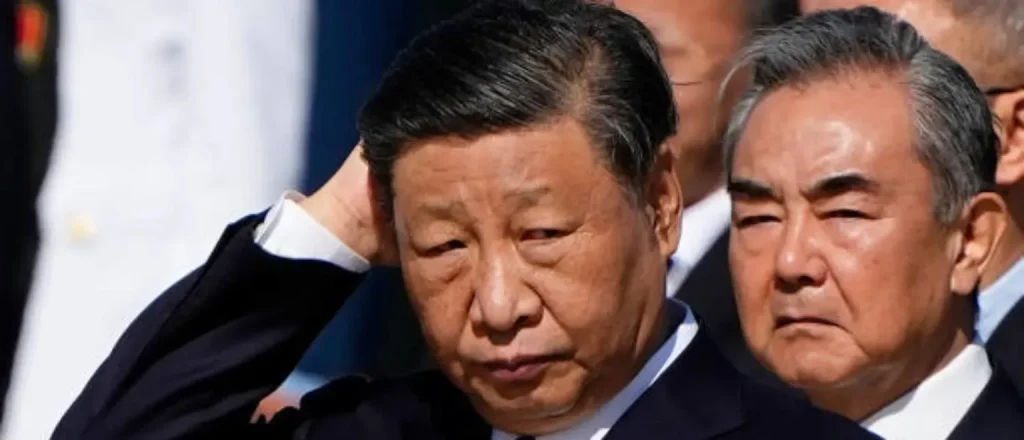China tariffs have become a pivotal issue in the ongoing U.S.-China trade discussions, marking a critical point in economic relations between these two global powerhouses. President Trump, known for his hardline stance, has insisted on maintaining the staggering 145% import duties on Chinese goods, demonstrating his commitment to what he sees as fair trade practices. With the backdrop of ongoing trade negotiations, many are questioning if these tariffs will hinder progress or if they are necessary for strong economic reforms. As talks loom, both sides are navigating a complex web of economic considerations, with China expressing its opposition to Trump’s tariff policies. The efficacy of these trade barriers not only affects bilateral relations but also impacts global markets, emphasizing the significance of the U.S.-China trade dynamic.
The escalating trade tensions between the United States and China have prompted a reevaluation of existing trade policies, particularly the hefty tariffs imposed on imports from China. With discussions around trade frameworks becoming increasingly urgent, the debate surrounding import duties has sparked intense scrutiny from economists and policymakers alike. In this context, many are examining the implications of Trump’s trade strategies, as well as their role in shaping future economic talks. As both nations strive to find common ground, understanding the ramifications of these tariffs will be essential not only in the context of bilateral relations but also in their broader impact on international trade policies.
Trump’s Firm Stance on China Tariffs
President Trump has made it clear that he is resolutely opposed to reducing the high tariffs placed on Chinese imports. This 145% import duty is part of his broader strategy to safeguard American economic interests and curb what he describes as unfair trade practices from China. Trump’s stance reflects a national sentiment resistant to compromising on tariffs, as he believes maintaining these tariffs is crucial for achieving favorable trade negotiations.
The implications of maintaining such high tariffs are significant for the U.S.-China trade dynamics. By holding firm, Trump aims to pressure China into making concessions that could lead to more balanced trade. However, this approach poses risks as it may disrupt global supply chains and affect American consumers with higher prices on goods that rely on imports from China.
Impact of Trump Tariffs on U.S.-China Trade Relations
The trade war initiated by Trump through the implementation of tariffs has dramatically altered the landscape of U.S.-China relations. Economic talks between the two nations have become increasingly strained as each side grapples with the repercussions of these high import duties. While Trump argues that these tariffs are necessary to reclaim lost revenue and protect American jobs, many economists warn that prolonged tariffs can lead to decreased trade volumes and economic uncertainty.
Moreover, the ongoing tensions have sparked widespread discussions regarding the future of global trade agreements. Negotiations are often characterized by give-and-take, yet Trump’s unwillingness to back down on tariffs complicates the path forward. As both nations prepare for more delicate discussions, the potential for a breakthrough will depend largely on whether China is willing to concede to some of the demands posed by the tariffs.
Economic Consequences of High Import Duties
High import duties on Chinese goods significantly affect various sectors within the U.S. economy. Industries that rely heavily on imported raw materials and products face increased costs, which can be passed on to consumers. This has raised concerns regarding inflation and the overall economic stability as higher prices could lead to reduced consumer spending, further impacting economic growth.
In addition, the agricultural sector has felt the strain of tariffs, as China represents a crucial market for American farmers. The response from China has included retaliatory tariffs, meaning that while Trump’s policies might aim to improve trade balances, the immediate outcome has resulted in disruptions and losses for U.S. exporters. The economic discussions surrounding trade and tariffs underscore the need for a balanced approach that considers the broad implications of such policies.
Trade Negotiations: Challenges and Opportunities
As the U.S. and China prepare for their next round of economic talks, the road ahead remains fraught with challenges. Trump’s unwavering position on tariffs complicates the landscape for negotiations, as it creates a backdrop of mistrust. Both sides must navigate through a web of previously set expectations and existing tariffs to reach a mutually beneficial agreement.
Conversely, these negotiations also present opportunities for both countries. By engaging in discussions, there is potential for creating more structured trade frameworks that can provide stability. Successful negotiations could lead to reduced tariffs or new trade agreements that not only benefit U.S. interests but also foster better relationships with one of the world’s largest economies.
Navigating U.S.-China Trade Talks
The upcoming trade talks between the U.S. and China will be pivotal in shaping the future of bilateral relations. With Trump’s tariff approach dominating discussions, both parties must be prepared to engage seriously regarding their economic priorities. The negotiations will not only focus on tariffs but also on broader aspects like intellectual property rights and trade fairness.
Effective communication and willingness to compromise may initiate a thaw in relations, providing a pathway to resolving longstanding issues. However, as history has shown, negotiating with China is complex and often laden with nationalistic sentiments, making it essential for the U.S. to approach these talks strategically.
Consumer Impact of Ongoing Tariffs
The repercussions of high tariffs imposed on Chinese goods extend beyond just the businesses; they reach the consumers directly. As import duties lead to increased prices on everyday products, American families are forced to weigh their budgets more carefully. Essential goods, particularly in sectors like electronics and clothing, have seen price hikes affecting household finances across the country.
Consumer sentiment can thus become a crucial factor during and after negotiations, as dissatisfaction regarding rising prices may influence public opinion on the effectiveness of Trump’s tariffs. The ongoing economic discourse is not just about trade figures; it encompasses the everyday experiences of American consumers and their purchasing power.
The Role of Economic Talks in Tariff Policies
Economic talks play a significant role in shaping tariff policies and trade relations between the U.S. and China. As both nations engage in discussions, they attempt to balance their national interests while addressing each other’s concerns. Trump’s insistence on high tariffs serves as a bargaining chip in these negotiations, reflecting a tough stance meant to pressure China into making concessions.
However, the effectiveness of this strategy remains debatable. Economic talks that lack an atmosphere of trust could lead to further confusion and conflict rather than resolution, emphasizing the importance of creating dialogue frameworks that encourage cooperation rather than competition.
Influence of Trade Talks on Future Tariff Adjustments
The outcomes of current trade negotiations will significantly influence future tariff adjustments. As Trump remains fixed on maintaining high tariffs, any agreements reached in the talks will likely shape the trajectory of these duties. Successful negotiations could lead to a de-escalation of tariffs or the imposition of conditions under which they could be reduced in the future.
Maintaining a forward-looking perspective is essential as both nations navigate the complexities of these discussions. The interplay of negotiations can inform trade strategies going forward, potentially creating a more stable economic relationship if tariffs can be constructively managed.
International Reactions to U.S.-China Tariff Policies
The global economic landscape is constantly affected by U.S.-China tariff policies, with international markets closely monitoring any developments. Countries that trade heavily with China or the U.S. are particularly sensitive to the fluctuations caused by these tariffs, as instability can disrupt their economic affairs.
Furthermore, the reactions from other nations often serve as an indicator of how the U.S.-China dynamics are perceived globally. International stakeholders might advocate for multilateral approaches to trade that can resolve disputes rather than relying solely on unilateral tariff measures, highlighting the interconnectedness of global trade relations.
Future of U.S.-China Trade Relations: Looking Ahead
As the U.S. and China embark on their latest economic talks, the future of their trade relations is uncertain. Trump’s firm stance on tariffs will undoubtedly be tested as both sides look to navigate the complexities of their negotiations. The potential for building a new framework of cooperation hinges on the outcomes of these discussions.
Looking ahead, finding common ground will be essential not only to stabilize tariffs but also to foster a prosperous trading relationship that benefits both nations. As each country approaches this pivotal moment, the decisions made will resonate well beyond the immediate economic implications, influencing global trade patterns for years to come.
Frequently Asked Questions
What are the current China tariffs imposed by the U.S. under Trump?
As of now, the United States has imposed high China tariffs, including import duties reaching up to 145%. These tariffs are part of an ongoing trade strategy aimed at addressing trade imbalances with China.
How do Trump tariffs affect U.S.-China trade negotiations?
Trump tariffs significantly impact U.S.-China trade negotiations, as President Trump has stated he would not reduce these tariffs to facilitate discussions. This firm stance complicates the diplomatic efforts aimed at resolving trade disputes.
What is the role of import duties in U.S.-China trade relations?
Import duties play a critical role in U.S.-China trade relations by increasing the cost of Chinese goods entering the U.S. This has led to tensions and retaliations, further complicating economic talks between the two nations.
How has Trump’s tariff strategy influenced trade talks with China?
Trump’s tariff strategy has been a double-edged sword; while it was intended to strengthen U.S. bargaining power in trade talks, it also sparked significant resistance from China, complicating efforts to reach an agreement.
What were the key messages from Trump regarding China tariffs in recent press interactions?
In recent press interactions, Trump emphasized his commitment to maintaining high China tariffs, asserting that they have helped stabilize U.S. financial losses and expressing skepticism about modifying import duties for negotiation purposes.
What is the significance of the upcoming U.S.-China trade negotiations in light of existing tariffs?
The upcoming U.S.-China trade negotiations are significant because they take place amid high China tariffs. These tariffs are a focal point in discussions that could impact economic relationships and global market stability.
Are there any potential changes to China tariffs expected from the upcoming trade talks?
It’s unlikely that we will see changes to China tariffs as President Trump has indicated a firm position against reducing tariffs for negotiations. Any substantial changes would require significant concessions from China.
What impact could high China tariffs have on American consumers?
High China tariffs can lead to increased prices for consumer goods, as import duties raise the cost of products sourced from China, ultimately affecting American consumers through higher market prices.
| Key Point | Details |
|---|---|
| Trump’s Stance on Tariffs | Trump refuses to reduce the 145% tariffs imposed on China, insisting on maintaining his position ahead of trade negotiations. |
| Upcoming Trade Talks | U.S. Treasury Secretary Scott Bessent is scheduled to meet with Chinese officials in Switzerland to discuss ongoing trade issues. |
| China’s Position | China opposes Trump’s tariff increases, indicating a firm stance in upcoming discussions. |
| Trump’s Economic Viewpoint | Trump believes the U.S. is no longer losing significant amounts in trade with China, highlighting a change in perspective due to tariffs. |
Summary
China tariffs remain a contentious issue as President Trump firmly stands by the steep import duties imposed on Chinese goods. His insistence on not reducing the 145% tariffs could complicate upcoming trade negotiations with China, especially as U.S. officials prepare for pivotal discussions. Examining Trump’s viewpoint, he maintains that rather than losing money, the trade situation has improved since the tariff implementation, suggesting a strategic move to leverage economic power against China. As talks unfold, the impact of these tariffs on the U.S.-China trade relationship will continue to be a significant factor.



